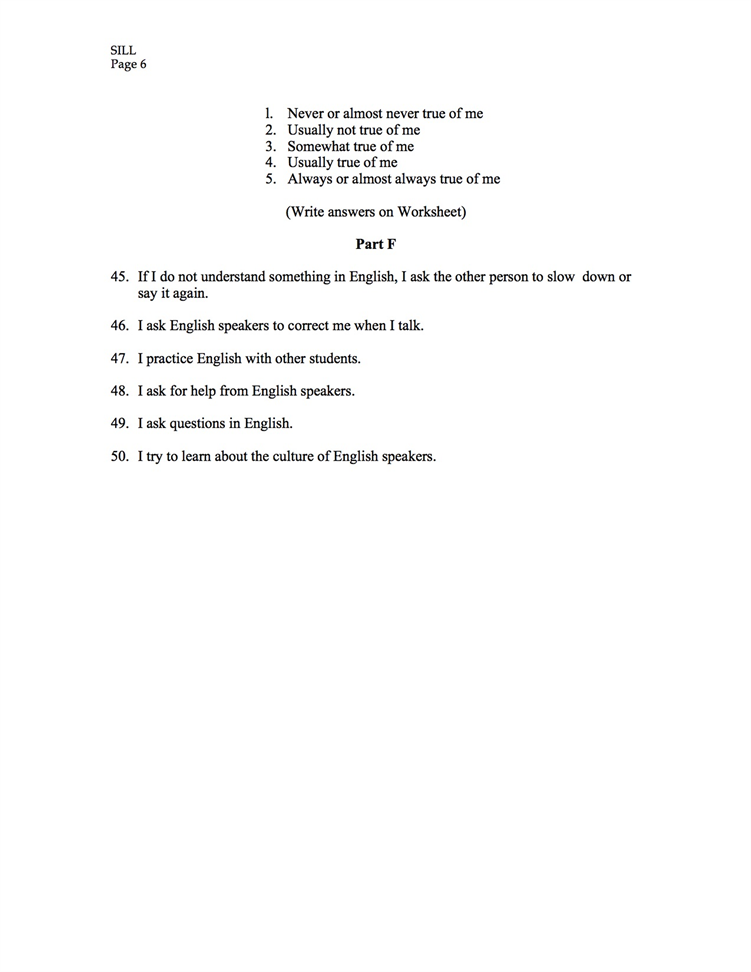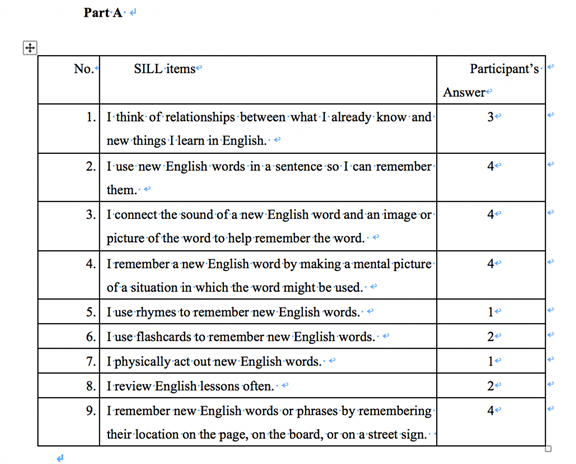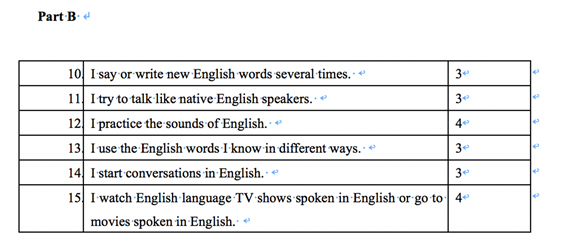Overseas English Testing: Pedagogy and Research
Vol.
02
No.
02
(
2020
), Article ID:
35842
,
19
pages
10.12677/OETPR.2020.22008
Investigating Learners’ Motivation and Strategy Use: A Case Study
Jinghan Li
Tianjin New Oriental School, Tianjin

Received: Apr. 22nd, 2020; accepted: May 11th, 2020; published: May 29th, 2020

ABSTRACT
L2 learning strategies and motivation, as crucial components of individual learner differences, have attracted huge attention from L2 researchers in the last two decades. This study tackles motivation and learning strategies based on the learning experience of a Turkish student at International House London. This study uses the Strategy Inventory for Language Learning to investigate the participant’s strategy use and explores the participant’s motivation with the help of interview. The findings of the study suggest that while less controlling teachers and positive feedback tend to motivate the students, more attention should be paid to strategy training for the students in order to help students learn more effectively.
Keywords:Learning Strategies, L2 Motivation, the Ideal L2 Self

学习动机、学习策略与二语学习: 一项个案研究
李靓涵
天津新东方学校,天津

收稿日期:2020年4月22日;录用日期:2020年5月11日;发布日期:2020年5月29日

摘 要
学习策略和学习动机是二语习得研究中两个非常重要的研究课题。本个案研究以标准化问卷(The Strategy Inventory for Language Learning)及访谈的方式,分析了该参与者学习动机、学习策略使用情况以及二者与参与者语言学习的关系。基于研究中发现的策略和动机与参与者二语学习的密切关系,教师应在教学活动中多给予正面反馈,多关注学生差异化的学习策略使用情况来促进其二语学习。
关键词 :学习策略,学习动机,理想二语自我

Copyright © 2020 by author(s) and Hans Publishers Inc.
This work is licensed under the Creative Commons Attribution International License (CC BY 4.0).
http://creativecommons.org/licenses/by/4.0/


1. 引言
从19世纪后期开始,研究者便开始关注成功的二语学习者的特性,这其中包括年龄,天赋,动机,学习策略,学习风格以及社会心理因素等。而其中学习动机和学习策略是该领域成果最丰厚的两个方向。本案例研究通过研究一位土耳其籍英语学习者的学习策略,旨在帮助教学者了解学生的学习特点并为教学提供支持。
2. 文献综述
2.1. 学习动机
2.1.1. 社会心理学阶段
Gardner及其同事在20世纪50年代所进行的研究取得了一系列关键性的研究成果。基于对加拿大双语环境下二语学习者的研究,Gardner和Lambert [1] 提出学习者对于第二语言以及二语社群的态度对于二语学习有直接影响。Gardner和 [2] 主要关注两种二语学习动机(如图1所示):融合型动机(integrative motivation)和工具型动机(instrumental orientation)。

Figure 1. Gardner’s socio-educational model of second language acquisition
图1. Gardner的融合动机框架概念
Gardner的理论首先将社会心理学因素和学习者个人因素结合起来,并影响了该领域之后几十年的研究方向。但Dörnyei和Ryan [3] 指出,尽管社会心理学研究视角极具创新性,其研究重点在于宏观层面的社会群体,而非个体二语学习者和二语学习课堂。
2.1.2. 认知–情境阶段
20世纪90年代初,有大批研究者注意到了基于社会心理学的研究与课堂教学环境有一定的差距。为了缩小这些差距,二语动机研究迎来了新的方向,这一时期被Dörnyei [4] 称为“认知–情境”阶段。该阶段的动机研究有两个主要趋势 [3]:1) 关注动机心理学领域和主流认知概念的新发展;2) 从关注宏观群体的二语学习动机转向关注具体教学情境中学习者的动机。
2.1.3. 社会–动态阶段
前文提到的研究已取得了丰硕的成果,但他们大多停留在静态的研究层面。Dorneyi 和Otto [5] 将“过程”的概念引入了学习者动机的研究。因此21世纪初期的研究开始有了动态的研究视角。与此同时,随着全球化和英语在世界范围内的应用,Gardner理论中的融入外语环境已不适用于全部的学习者。因此,Dorneyi [4] 提出了二语动机自我体系。
该体系有三个组成部分:理想二语自我(the Ideal L2 self)、应该二语自我(the Ought-to L2)和二语学习经历(L2 learning experiences)。理想二语自我是学习者想要成为的样子。如果学习者能够意识到理想自我和当下状态的差距,他很可能会更有动力去学习外语来缩小这种差距。应该二语自我体现了学习者为迎合外界要求或避免负面结果认为自己应该具有的素质。二语学习经历则关注学习者的学习环境和学习经历对学习动机的影响。
2.2. 学习策略
早期的研究就已经指出天赋和动机不是仅有的两个决定学习者成功与否的因素,因此很多学者致力于研究学习者在学习过程中的主动参与和学习技巧。由于主流心理学研究未能将策略性行为和普通的学习行为区分开来,学者们纷纷提出了各自对于学习策略的定义。
Rubin [6] 认为学习策略是学习者为了获取知识而使用的技巧或工具。O’Malley and Chamot [7] 则强调策略的认知层面,认为学习策略是学习者的特殊思考或行为。根据学习策略和语言材料的关系,Oxford [8] 将其分成直接策略和间接策略。其中直接策略包括记忆策略、认知策略、补偿策略,而间接策略包括元认知策略、情感策略和社会策略。直接策略负责处理新语言内容,间接策略则服务于学习的管理。基于这一分类,Oxford设计了语言学习策略量表(The Strategy Inventory of Language Learning, SILL)。在帮助学习者了解和评估自己的学习策略方面,SILL量表也成为了目前为止使用最为广泛的工具。通过SILL,Oxford发现娴熟的学习者往往会更频繁的使用学习策略。
在之后的学习策略研究中,有学者呼吁应该关注策略使用的得当性。Ehrman,Leaver和Oxford [9] 指出策略的好坏应该结合具体学习情境来看。这样的主张意味着研究者不再试图将“优秀”学习者的“好”策略照搬到较弱的学习者身上。由于SILL量表的得分仅仅取决于各项策略的使用频率,Yamomori [10] 认为其结果不能完全体现一个人是否算成功的学习者。Kazamia [11] 也指出由于SILL量表是标准化问卷,不能体现个体差异性,其所列学习策略未能涵盖所有具体学习动作。
3. 研究设计
3.1. 研究问题
本研究主要为了了解International House London一名土耳其籍学习者(Zeynep)的学习动机和学习策略,并旨在回答下列问题:
• Zeynep在英语学习中通常使用哪些策略?
• Zeynep的英语学习动机是什么?
• Zeynep是否认为自己是一名成功的学习者以及她眼中成功或失败的原因是什么?
• Zeynep对当下的学习环境(International House London)的态度如何?和之前她在土耳其的学习环境有何异同?
• Zeynep有无具体的学习目标?
• Zeynep在学习过程中是否获得了其他人(如老师或家人)的支持?这些支持对她的学习动机有哪些影响?
3.2. 研究对象与研究工具
本研究采用了语言学习策略量表(SILL)和访谈来研究学习者的学习动机和策略。同时使用定量研究和定性研究能够避免过于依赖单一的研究手法而产生的局限性。
研究参与者Zeynep是一名来自土耳其的年轻女性。她的丈夫目前在伦敦读博,她也一同来到英国陪读。考虑到将在伦敦居住三年,她参加了International House London的语言课程。入班时,学生的分班成绩为进阶级班(intermediate),接近欧盟语言框架(CEFR)中的B1水平。笔者曾经在International House London担任Zeynep的老师,注意到她是一名活跃的课堂参与者,同时也具备足够的语言能力来完成英文访谈。
本个案研究地点位于International House London,笔者邀请她回答SILL量表(见附录1)以及进行访谈,并将访谈内容进行转录分析(英文全文见附录3)。访谈的第一部分内容主要关注学习动机,基于Zeynep的SILL问卷回答结果,笔者追问了更多关于策略使用的问题。
4. 结果与讨论
4.1. 学习策略
将SILL中的六个分类下各自的单项分数相加,再除以该分类下的项目数,能够得到研究对象每个分类的平均得分。用所有单项分数的总和除以50 (SILL的问题总数)可以得到研究对象的综合平均得分,具体结果见表1。
Table 1. Zeynep’s mean score of each category and overall average
表1. Zeynep各项策略的使用得分和综合使用得分
Oxford [8] 认为3.5及以上的平均分反映出学习策略的高频使用,2.5~3.4分为中等频率,而2.5分以下则是低频使用。根据表1中的数据可以发现,综合来看Zeynep属于中等频率的使用者。Green和Oxford [12] 的研究曾指出语言水平和策略使用之间的相关性,而Zeynep的中等频率得分和她的语言等级(intermediate)相匹配,与Green和Oxford的研究结果一致。从单独的策略类别来看,Zeynep高频使用补偿策略,较少使用元认知策略和情感策略。
考虑到SILL不能覆盖单独个体的所有具体策略行为,在浏览Zeynep的SILL回答后,笔者又根据她的回答进行了追问采访,并将采访数据和问卷回答进行比较(见表2)。
Table 2. The Comparison between SILL items and interview data
表2. SILL量表条目和相关访谈数据
SILL量表中的第7和第35个条目Zeynep给自己的打分均为1(从不或几乎从不)。但通过采访(见上表2),笔者发现虽然她很少做出表中所列行为,但事实上她会使用一些类似的策略。例如,她会借助图片而非动作帮助记忆。她虽然从不“寻找”能够和她练习英语的人,但在她的日常生活中,她会和同学以及自己的丈夫练习英语。她的这些学习行为也反映出SILL量表的局限性,即它无法涵盖来自不同背景的学习者会使用的不同策略。
4.2. 学习动机
4.2.1. 归因于以前的学习经历
Zeynep在访谈中的回答(见摘录1,摘录2)反映出她将目前在英语学习中的进展归因于她以往的学习经历,这些经历影响着她的学习计划以及她对未来学习的态度。
摘录1:
笔者:你学了多久英语了?
Zeynep (下文简称Z):有……其实我六、七年前学过英语,但我有7年没有用过了。所以我忘记了一些。其实我语法和单词还都记得,但口语很弱……我口语一直很弱。
笔者:你是指是高中还是大学学的英语?
Z:准备考大学的时候。
笔者:啊这样。
Z:其实在土耳其我们从小学就开始学英语,但是我们总是在学语法
摘录2:
笔者:对你来说英语考试成绩重要吗?
Z:重要。对我来说挺重要的。比如我上大学的时候,我特别用功……然后考试成绩很高。我总是想多拿分。
Extract 3:
笔者:你觉得自己是一个成功的学习者吗?加入从1~5来打分,5是非常成功,1是很一般,你会给自己打几分?
Z:我觉得我……3分吧。3分就差不多了。
笔者:为什么呢?
Z:因为我现在才刚开始捡起英语。如果我很用功的话将来也许可以达到5分。
Zeynep在以上访谈摘录中的符合Ushioda [13] 所提出的积极动机思考中的归因模式:1) 将不够成功的学习(较弱的口语能力)归因于暂时的障碍(土耳其英语教学更关注语法)。2) 将成功的学习(在考试中取得好成绩)归因于内部因素(刻苦学习)。
4.2.2. 自主与内部学习动机
Zeynep表示与她在土耳其接触过的英语老师相比,她更喜欢International House London的老师。她很享受在伦敦的学习经历,并且展现出了较强的自主性(见摘录4)。
Extract 4:
笔者:你刚刚说你更喜欢这里(International House London)的学习环境。那老师呢?这里的老师和你在土耳其的老师有什么不同吗?
Z:这里的老师特别亲切友善。
笔者:那土耳其的老师很严格吗?
Z:倒也不是。有一些……很严格。
笔者:但不是全都很严格。
Z:对,不全是。
笔者:那这里的老师有什么不一样吗?你更喜欢哪里的老师?
Z:我喜欢这里的老师……他们总是鼓励我们……他们会说“很棒!”……总是在鼓励我们。他们就像……朋友一样……我会觉得更……自信。有时他们还会让我们自己讨论决定作业是什么。
笔者:所以你觉得在这你有更多的自由?
Z:是的……
Noels [14] 指出当老师的掌控弱化时,学生有可能会更有自主性。而Zeynep面对亲切鼓励型的老展现了了更强的自信和内在动机,这也印证了Noel的主张。
4.2.3. 理想二语自我、应该二语自我和二语学习经历
理想二语自我
在谈到学习英语的理由和目标时,Zeynep表示她的理想二语自我不仅能够在伦敦使用英语和别人交谈,也有利于她在土耳其的生活。另外,她还谈到她的理想目标时能够通过英语继续深造学习(见摘录5)。
Extract 5:
笔者:你为什么会来 International House学英语?
Z:我要在伦敦住上……3年。而且英语是一个通用语言,在我的国家也很重要。
笔者:看来在土耳其英语很重要。
Z:是的。我希望在伦敦……即使没有我丈夫的陪伴……我也能和外国人交流。所以我必须学英语。
笔者:除了以上的原因,你以后就业会用到英语吗?
Z:会的。我觉得……将来……我可以学习……心理学。我可以用英语读一个心理学的硕士学位。
Zeynep的回答既展现出融合型动机,也反映出工具型动机。她对和在伦敦的英语母语者交谈的渴望反映出融合依然是二语学习者的一个主要动机。Dörnyei [4] 认为英语在非英语国家的广泛使用意味着融合不再仅仅等同于融入一个外语国家。而Zeynep所强调的英语在土耳其的重要性也证实了这一点。她希望将来能够通过英语来攻读硕士学位,这也符合Dörnyei [4] 所提出的内在工具型动机(获得职业性成功)和理想二语自我有密切关系。
应该二语自我
Zeynep是为了陪伴在伦敦读博的丈夫而来到英国的,在访谈中,她也谈到了丈夫的支持和鼓励对她来说很重要(见摘录6)。
摘录6:
笔者:你丈夫支持你学英语吗?
Z:支持。
笔者:他会帮助你学习吗?
Z:是的,他总是鼓励我,一直以来都是。他总是说“你能讲出来的。”“别担心。”他也经常鼓励我和他聊英语学习的问题。
从摘录6可以看出,丈夫的鼓励和期待是激励着Zeynep英语学习的主要外部动机之一。这也验证了Dörnyei [3] 对应该二语自我和外部动机的看法。
二语学习经历
除了上文提到的教学风格外,Zeynep对伦敦英语课程的内容设置也比较满意(见摘录7)。
摘录7:
笔者:你喜欢这里的学习环境吗?和土耳其比起来差别大吗?
Z:我喜欢这里。因为老师不是只教我们语法。语法也会教但是还有其他内容。其实我在土耳其也会学听说读写,但主要都是语法。在这,听说读写的能力老师们都会涉及。可能写作教的少。我喜欢这里的环境。
5. 结论
通过定向定量相结合的研究方法,该个案研究了International House London一名土耳其籍学习者的学习动机和学习策略。
该个案的大部分研究结果都和这两个领域已有的主流研究一致。除了理想二语自我和应该二语自我外,教师,课程设置以及以往的学习经历等因素都对学习者的动机有重要影响。
在研究学习者的策略使用方面,SILL量表作为标准化问卷能够就策略使用频率和策略多样性为研究者提供较为可靠的信息。但针对一个学习者的个案研究,其结论不具有外界效度。在今后的研究中,可以借助SILL量表和访谈继续研究同一国籍不同语言能力的多名学习者,从而观察某一特定的学习者群体。考虑到不同文化中学习者的差异性,研究者也应该结合研究对象的特点对SILL量表中的条目进行适当改编,增加目标群体广泛使用的策略,删减过时或极少被使用的策略。
该研究为教学提供了一些启示。语言教师应该关注学习者的学习风格,帮助学生意识到自己使用的学习策略,同时引导他们去管理调控这些策略,而不是让所有学生模仿照搬某个“好”策略。此外,教师也应当注意不要过度掌控课堂,给学生一定的自由度,多进行积极正面的反馈从而促进学生理想二语自我的建立。
文章引用
李靓涵. 学习动机、学习策略与二语学习:一项个案研究
Investigating Learners’ Motivation and Strategy Use: A Case Study[J]. 国外英语考试教学与研究, 2020, 02(02): 80-98. https://doi.org/10.12677/OETPR.2020.22008
参考文献
- 1. Gardner, R.C. and Lambert, W.E. (1972) Attitudes and Motivation in Second Language Learning. Newbury House, Rowley.
- 2. Gardner, R.C. and MacIntyre, P.D. (1993) A Student’s Contributions to Second-Language Learning. Part II: Affective Variables. Language Teaching, 26, 1-11. https://doi.org/10.1017/S0261444800000045
- 3. Dörnyei, Z. and Ryan, S. (2015) The Psychology of the Language Learner Revisited. Routledge, New York. https://doi.org/10.4324/9781315779553
- 4. Dörnyei, Z. (2005) The Psychology of the Language Learner: Individual Differences in Second Language Acquisition. Lawrence Erlbaum Associates, Hillsdale.
- 5. Dörnyei, Z. and Otto, I. (1998) Motivation in Action: A Process Model of L2 Motivation. Working Papers in Applied Linguistics (Thames Valley University, London), 4, 43-69. https://nottingham-repository.worktribe.com/output/1024190
- 6. Rubin, J. (1975) What the “Good Language Learner” Can Teach Us. TESOL Quarterly, 9, 41-51. https://doi.org/10.2307/3586011
- 7. O’malley, J.M. and Chamot, A.U. (1990) Learning Strategies in Second Language Ac-quisition. Cambridge University Press, Cambridge. https://doi.org/10.1017/CBO9781139524490
- 8. Oxford, R.L. (1990) Language Learning Strategies: What Every Teacher Should Know. Newbury House, New York.
- 9. Ehrman, M.E., Leaver, B.L. and Oxford, R.L. (2003) A Brief Overview of Individual Differences in Second Language Learning. System, 31, 313-330. https://doi.org/10.1016/S0346-251X(03)00045-9
- 10. Yamamori, K., Isoda, T., Hiromori, T. and Oxford, R.L. (2003) Using Cluster Analysis to Uncover L2 Learner Differences in Strategy Use, Will to Learn, and Achievement over Time. IRAL, 41, 381-410. https://doi.org/10.1515/iral.2003.017
- 11. Kazamia, V. (2010) Using the SILL to Record the Language Learning Strategy Use: Suggestions for the Greek EFL Population. The 14th International Conference of Applied Linguistics, Thessaloniki, 14-16 December 2010, 277-293.
- 12. Green, J.M. and Oxford, R. (1995) A Closer Look at Learning Strategies, L2 Proficiency, and Gender. TESOL Quarterly, 29, 261-297. https://doi.org/10.2307/3587625
- 13. Ushioda, E. (2001) Language Learning at University: Exploring the Role of Motivational Thinking. In: Dörnyei, Z. and Schmidt, R., Eds., Motivation and Second Language Acquisition, University of Hawaii Press, Honolulu, 91-124.
- 14. Noels, K.A. (2001) Learning Spanish as a Second Language: Learners’ Orientations and Perceptions of Their Teachers’ Communication Style. Language Learning, 51, 107-144. https://doi.org/10.1111/0023-8333.00149
附录1. Strategy Inventory for Language Learning (SILL) SILL量表






附录2. Zeynep的SILL量表答案





附录3. 访谈英文原文
Interviewer = L Interviewee = Z
L: So…S, how long have you been London?
Z: I have been ... for six months.
L: Why you came to London?
Z: Because of my husband study ... He is a student.
L: Ah Is he doing Master’s or ... ?
Z: PhD about Mathematics
L: Wow. That’s really cool. He must be really smart.
Z: (smile) Yeah, I think he is.
L: How long have you been learning English?
Z: For ... Actually I learned 6 ... or 7 years ago, but I didn’t use for 7 years. That’s why I forgot something. Actually I remember the grammar or words but speaking is weak ... always for me.
L: Was that in high school or college?
Z: Preparation for university.
L: Ah.
Z: Actually Turkish people start to learn when they are in primary school, but always we learn always grammar.
L: So in Turkish it’s really all about grammar.
Z: Yes.
L: Why do you want to learn English in International House?
Z: I am going to stay in London ... for three years ... and also English is universal language. It’s important in my country.
L: Ah, it’s also important in Turkey.
Z: Yes. Yes. I want to speak with foreign people in London ... on my own ... without my husband. That’s why it’s necessary to learn English.
L: I see. Apart from that, do you need English to find a job?
Z: Yes. I think ... in the future ... I can go study for ... about psychology so I can do Master about psychology.
L: Did you do a Bachelor in psychology? 4 years in college?
Z: uhm.
L: Wow. Can you read my mind then? (laughter)
Z: (laughter)
L: OK. So just like you said, it’s important to learn English to talk people and to apply for school right?
Z: Yes.
L: Do you set goals when you learn English? For example, by the end of the year, I want to be able to talk to people in fluent English or I want to get 6 in the IELTS test.
Do you have goals like that?
Z: Yes! For example, when I start the course it was very difficult for me because I couldn’t speak good, but now it’s better now than before. At the end of the course, I want to speak very well, flu ...
L: Fluently.
Z: Fluently, yes.
L: So your goal is to be able to talk to people fluently.
Z: Yes, without stopping.
L: Yeah. When did you start the course?
Z: Hmmm December.
L: Oh right, you were with my group.
Z: Yes.
L: And you have been taking this course since December?
Z: Yes.
L: So how do you find the learning environment here? Compared to that it Turkey. Is it different?
Z: Yes. Because the teachers don’t teach us just grammar. They teach grammar also but not just grammar. Actually we learn speaking, listening, reading and writing in Turkey but mostly grammar. Here ... They focus on all of them ... without writing I think. I like the ...
L: the environment?
Z: Yes.
L: So you like the environment here better, ok. What about the teachers? How are they different than teachers in Turkey?
Z: Teachers here are really nice.
L: In Turkey are teachers really strict?
Z: Actually no. Some of them are ... strict.
L: but not all of them.
Z: Yes, not all of them.
L: How are they different from teachers here? Who do you prefer?
Z: I like teachers here…they encourage us…they say “good job” …they always encourage us. They talk to us like ... friends… I feel more…confident. Sometimes they will ask us to choose our homework…
L: So more freedom right?
Z: Yeah.
L: Does your husband support your study?
Z: Yes.
L: Does he help with your learning?
Z: Yes, he encourages me, always. “You can speak.” “Don’t worry.” And he always tell me, “You can talk to me about English.” “You can ask me questions about English.”
L: That’s really nice! And what do you think is really difficult when you learn English? ... What is the most difficult thing for you?
Z: The most difficult is ... speaking I think (laughter.) Actually I learned a lot of words and I can understand people when they are speaking in English, but it’s difficult for me to speak.
L: So you can understand them.
Z: Yes, but when I want to speak English, the words won’t come in my mind (laughter).
L: So you understand other people and you know what you want to say, you just can’t express it in English. I know that feeling. Do you feel confident about learning English and using English?
Z: Actually sometimes, yes.
L: When do you feel confident?
Z: Sometimes I can speak easily. Sometimes I can’t speak. That’s why sometimes I feel comfortable ... I feel good about learning English, but sometimes I think why I am here in London.
L: Aww. Is that when you can’t express yourself?
Z: I feel bad of course ... sometimes. I have to speak English with people.
L: Yes, I know that feeling. So is it important for you to get good grades in the exams?
Z: Yes. Yes. It is important for me. For example, when I was in the university ..., I worked hard ... and I get to high level. I always want to do more points.
L: Ah, gain more points.
Z: Gain more points yes. That’s why I worked hard. Actually, it’s a good thing without exam, it’s easy and very enjoyable. (laughter)
L: Ok, so you don’t like exams but you feel really confident when you get good grades in exams.
Z: Yes.
L: Ok. Do you think you are a successful learner? From 1 - 5 what would you rate yourself? 5 for really successful, 1 for just so so.
Z: I think I am ... 3. 3 is enough.
L: Why 3?
Z: Because now I just started. If I work hard maybe in the future I will be a 5. (laughter)
L: Yes, I agree! You will definitely be a 5 in the future. OK, let’s take a look at your SILL answers. So how do you usually remember new words? You wrote that you seldom act words out. Then do you imagine pictures?
Z: Yes. Yes. Sometimes I look up pictures to help. I remember the picture.
L: When do you usually need to speak English?
Z: When I go out…in London. Also, when I am here (International House). I speak English with other students.
L: You mentioned that your husband really supports your study. Do you ask him questions about English?
Z: Yes…Sometimes I ask him if my sentences are right …..or how to say something in English.
L: OK. I think I’ve got all I need. Thank you so much for your participation.
